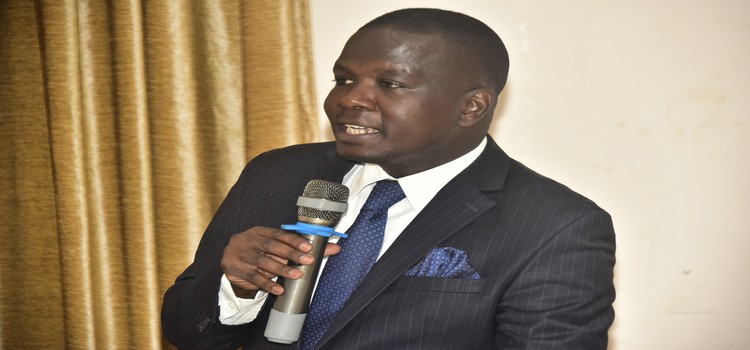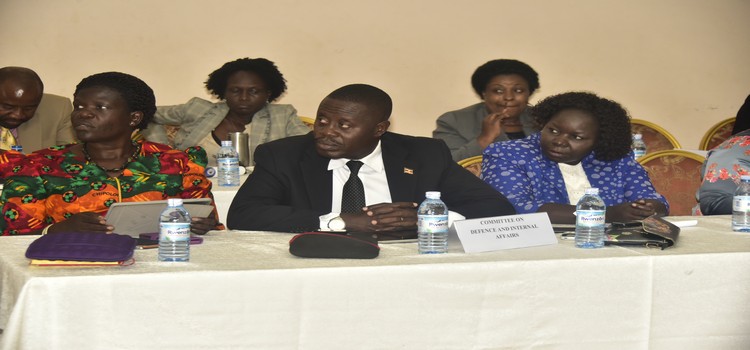Anti-Slavery Bill divides stakeholders

Stakeholders attending a workshop on the Anti-slavery Bill, 2019 were divided on the object of the bill which seeks to make provisions for the prohibition of slavery, servitude and forced or compulsory labour.
A number of participants were concerned that the Bill is a form of witch-hunt to fight companies involved in the exportation of labour especially to the Middle-East.
This followed a presentation by a seconder of the bill, Hon Henry Kibalya who stated that the Bill seeks to ensure that companies involved in the trade exercise responsibility by following up on the well-being of their clients.
He added some companies were exporting people to countries where they were being abused after promising them what he referred to as ‘heaven on earth’.
Last year, Soroti Municipality MP, Hon. Herbert Ariko was granted leave of Parliament to introduce the Private Member’s Bill.
Ariko said that the laws on slavery including the Constitution, the Penal code Act and the Prevention of Trafficking in Persons Act, 2009 consider slavery as the buying and selling of human beings but do not deal with the modern forms prevalent today.
Ariko with his seconders, Hon. Agnes Kunihira (NRM, Workers) and Kibalya (NRM, Bugabula South) held a public awareness and sensitization meeting with Civil Society, government institutions and parliamentary committees of Gender, Labour and Social Development, Human Rights, Legal and Parliamentary Affairs, Foreign Affairs and Defence and Internal Affairs. The seminar took place at the Imperial Royale Hotel on Wednesday, 18 March 2020.
Hon. Latif Ssebagala (Indep., Kawempe North) said the Bill should not be used as a tool to fight exportation of labour because the percentage of those suffering is insignificant.
“We interacted with the Uganda Association in Qatar and they interestingly said they are being treated well which I think we should attributed to the Memoranda of Understanding with the country,” he said.
Ssebagala said that companies involved in export of labour have done a good job reducing unemployment.
“These companies export in thousands and it is possible that there may some hiccups here and there but it does not mean that these companies should be criminalised,” he said
Ssebagala advised that extra focus should be on signing of memorand with the countries that receive a large number of Ugandans.

However, Hon. Kibalya said the Bill is not intended to fight any company or stop exportation of labour but ensure that the process is free of irregularities.
“We do not understand why we should be worried about this Bill when all it seeks to curb are the vices in the trade; if you are doing the right thing, export people for proper jobs instead of exploitation,” he added.
Hon. Lowila Oketayot (NRM, Pader District) wondered child trafficking and slavery are not addressed by other laws in existence.
“Child labour for example, has been addressed by the Children’s Act; has there been enough research done to ensure these issues are not being recaptured; if so, this should be an amendment,” Oketayot said.
The Head of Trafficking in the Directorate of Public Prosecution, Rachel Bikholesaid that certain aspects of the Bill like bondage, child trafficking and early marriages are covered in the Prevention of Trafficking in Persons Act 2009.
She said the issues that arise in this area just need amendments but not a new law.
“We have registered several prosecutions under this law and got convictions that are as high as 30 years around the country encased in this law; this act is also victim centred and punitive in nature,” she said.
Bikhole said that all these offences raised by the Bill are being prosecuted under the Act, though, amendments are welcome.
Ariko said that the Bill seeks to come up with solutions to the failures of the current law that have failed to make it beyond prosecution.
“When we carried out legal research, the percentage of convictions were very minimal because the defendants were always defeating prosecution on the technicalities of trafficking,” he added.
Ariko also stated that the concept of modern day slavery has not been handled in detail as is indicated in a lot of scholarly material by the prevailing laws. These are loopholes that the Bill intends to address in totality.
He added that the amendments intended constitute more than 40 per cent of the current law warranting, in accordance with legislative law, the introduction of a new Bill.
The members promised to submit the Bill for the First Reading in two weeks’ time.
